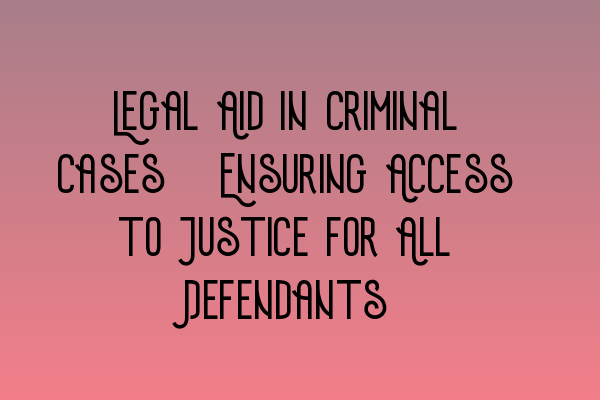Legal Aid in Criminal Cases: Ensuring Access to Justice for All Defendants
Access to justice is a fundamental right for all individuals, and it is crucial that defendants in criminal cases have the opportunity to defend themselves effectively. This is where legal aid plays a vital role in ensuring that every person, regardless of their financial situation, has access to the legal representation they need.
Legal aid is a government scheme that provides financial support to individuals who cannot afford to pay for legal advice or representation. In criminal cases, legal aid is particularly important, as the consequences can be severe, including imprisonment and a criminal record.
Why is Legal Aid Important in Criminal Cases?
Legal aid plays a crucial role in upholding the principle of equality before the law. It ensures that all defendants have an equal opportunity to defend themselves and present their case in a court of law. Without legal aid, individuals with limited financial means would be at a significant disadvantage, unable to afford legal representation and navigate the complexities of the criminal justice system.
Furthermore, legal aid promotes fairness and helps to prevent wrongful convictions. It enables defendants to access the resources and expertise of trained legal professionals who can gather evidence, challenge the prosecution’s case, and ensure that their client’s rights are protected.
However, access to legal aid in criminal cases has become increasingly challenging in recent years. Legal aid funding has been subject to significant cuts, limiting the availability of legal representation for those who need it most. This situation has raised concerns about the erosion of access to justice and the impact it has on the fairness of criminal proceedings.
The Means Test: Assessing Eligibility for Legal Aid
In order to ensure that legal aid is appropriately allocated, a means test is conducted to assess an individual’s eligibility. The means test takes into account an individual’s income, assets, and financial circumstances to determine whether they qualify for legal aid.
While the means test is necessary to ensure that limited resources are allocated to those who need them most, there have been criticisms that it can be overly restrictive. Some individuals may fall just above the threshold for legal aid but still struggle to afford the costs of representation, leaving them in a vulnerable position.
It is essential that the means test is regularly reviewed and updated to reflect changes in living costs and economic circumstances. This will help to ensure that individuals who may be on the borderline of eligibility are not left without legal representation.
Improving Access to Legal Aid in Criminal Cases
Given the importance of legal aid in ensuring access to justice for all defendants, it is crucial to explore ways to improve its availability and effectiveness in criminal cases.
Firstly, there need to be adequate levels of funding allocated to legal aid to ensure that it remains accessible to those who need it. This requires a commitment from the government to prioritize access to justice and provide the necessary resources to support legal aid services.
Secondly, there should be a simplification of the application process for legal aid. Complex and time-consuming application procedures can deter individuals from seeking legal aid, potentially depriving them of their right to a fair trial. Streamlining the process and providing clear guidance will help to ensure that those who qualify for legal aid can access it without unnecessary delays and obstacles.
Thirdly, there should be better promotion and awareness of legal aid services. Many individuals may not be aware of their rights or the availability of legal aid. Increased public information campaigns and outreach initiatives can help to educate individuals and ensure that legal aid services are reaching those who need them.
Conclusion
Legal aid is a cornerstone of a fair and just criminal justice system. It is essential in ensuring that all defendants, regardless of their financial circumstances, have access to legal representation and a fair trial. However, the availability and effectiveness of legal aid in criminal cases have faced challenges in recent years. It is crucial for the government to prioritize and invest in legal aid, addressing funding issues, simplifying application procedures, and promoting awareness of legal aid services. Only by doing so can we ensure that access to justice is upheld and that every defendant has a fighting chance in the courtroom.
Related Articles:
